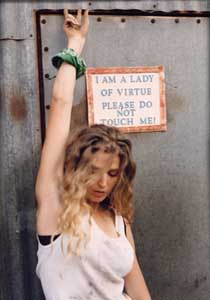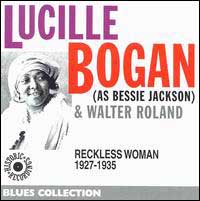-
- Despite accolades in death, Reagan legacy still troubles many
- Transgender community watching teen’s slaying case
- State pulls funding for GLBT Center’s anti-smoking efforts
- Criminal charges dismissed against West
- Pride parade held for first time since same-sex marriage legalized
- Activists urging Virginia boycott over anti-gay law
- National News Briefs
- World News Briefs
Arts & Entertainment
Who’s gay, who’s not: taking stock of some recent tabloid tunes
Published Thursday, 17-Jun-2004 in issue 860
On Patience (Aegean/Epic), his first album of all original tunes since 1996’s “Older”, tabloid favorite George Michael patiently inches closer to the spirit of early career masterworks such as Faith and Listen Without Prejudice. Making a conscious effort to strike a balance between his exuberant dance-floor persona and his serious ballad singer side, Michael, who, according to the BBC, has said that Patience will be his final “album for sale in record shops,” is going out in style. Songs such as “Round Here” (with its references to musical influences and contemporaries) and “My Mother Had a Brother” have a deeply personal quality to them. Also revealing is “American Angel”, a love song about Michael’s life partner Kenny Goss. The equally aptly titled “Amazing” and “Flawless” rightfully return Michael to the dance floor where he belongs. Religious references on songs such as “John and Elvis Are Dead”, “Through” and the title track permeate the album without overwhelming it.
Smooth jazz superstar Dave Koz avoided the tabloids by granting a coming out interview to The Advocate in April of 2004, and was recently featured in the GLT. Clearing the air on his identity, Koz also fills the air with the brassy sounds of his soprano, alto and tenor saxophones on his most recent release Saxophonic (Capitol). The baker’s dozen tracks, all co-composed by Koz, are broken down into three acts and a curtain call, and range from standard smooth jazz fare (“Honey-Dipped”), R&B flavored numbers (“Love Changes Everything”, featuring backing vocals by Brian McKnight), hip-hop powered cuts (“All I See Is You”, “Let It Free” and the wonderful “Sound of the Underground”, featuring Chris Botti’s distinctive trumpet work) and romantic ballads (“Just To Be Next To You” and “I Believe”).
If Lucille Bogan were alive today, she might have been fodder for the tabs. The recordings that Bogan (later repackaged by a record company as “Bessie Jackson”) made between 1933 and 1935, and collected on The Best of Lucille Bogan (Columbia/Legacy), have the scandalous irreverence of the boogie-woogie blues compositions of the era. Sexually suggestive (“Barbecue Bess”, “Stew Meat Blues”, “Groceries On The Shelf”) and rife with references to substance abuse (“Drinking Blues”, “Baking Powder Blues”), Bogan made perhaps her most controversial statement on “B.D. Woman’s Blues”. “B.D. ”, an abbreviation for bull dyke, includes the lines “Went out last night with a crowd of my friends/Musta been women, ’cause I don’t like men.”
Long a subject of speculation, if not by the tabloids, then certainly by his LGBT fans, the sexually ambiguous Morrissey has returned with his latest album (his first in seven years), You Are the Quarry (Attack/Sanctuary). A machine-gun-toting Morrissey takes aim at America on the opening track “America Is Not the World”, in which he makes the musical statement, “the land of the Free, they said and of opportunity/in a Just and Truthful way/but where the President/is never black, female or gay/and until that day/you’ve got nothing to say to me.” Morrissey doesn’t abandon the queer line on “All the Lazy Dykes”, on which he sings about a woman, “just somebody’s wife,” who “one sweet day – an emotional whirl/you will be good to yourself/and you’ll come join the girls.” Morrissey also doesn’t disappoint in the song title (or content) department on tracks such as “I Have Forgiven Jesus”, “The World Is Full of Crashing Bores”, “How Can Anybody Possibly Know How I Feel?” and “First of the Gang To Die.”
Who is gay and who isn’t has long been fodder for the tabloids. Photos of actors who play queer characters are often splashed across the pages of the publications, and the cast of “The L Word” will be no exception. The L Word: Music From The Showtime Original Series (Tommy Boy) could have been the perfect venue for introducing fans of the show and music lovers alike to the bountiful world of lesbian music, or any queer artists for that matter. Instead, the only outwardly queer artists we get are The Murmurs (of which “L Word” star Leisha Hailey is a former member) singing the k.d. lang-produced “Genius”, women’s music festival favorite Kinnie Starr (the unexpectedly accessible “Alright”), openly bisexual artists such as Marianne Faithfull (“The Pleasure Song”) and Frances Faye (“Frances & Her Friends”, a classic list song about same sex-pairings) and reigning gay diva Rufus Wainwright (a sensational and moving cover of Leonard Cohen’s “Hallelujah”, that actually made me forget about the late Jeff Buckley’s stirring rendition). A pair of straight lesbian icons, Lucinda Williams (“Right In Time”) and Joan Armatrading (“The Weakness In Me”, a song that has been covered by Melissa Etheridge), and a pair of tracks by old school divas Ella Fitzgerald (“Let’s Do It”) and Connie Francis (“Everybody’s Somebody’s Fool”) are almost predictable novelties. If, like “Queer As Folk”, this series inspires other soundtrack volumes, it would be nice to hear tracks by Phranc, Melissa Ferrick or Kristi Martel, The Butchies, Le Tigre or the late, lamented Bitch and Animal.
Sophie B. Hawkins created her own sort of tabloid situation via the intimate 1998 documentary The Cream Will Rise, in which Hawkins revealed a history of sexual abuse among other things. With songs such as “Beautiful Girl” and “Sweet Sexy Woman”, the self-professed “omnisexual” artist proudly exhibits her female attraction on her new album Wilderness (Trumpet Swan/Lightyear). A solid effort, standout tracks include “Meet Me On A Rooftop”, “Walking On Thin Ice”, “Blue” and the Beach Boys-like “Surfer Girl”.
|
|
Copyright © 2003-2025 Uptown Publications




